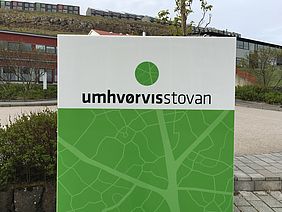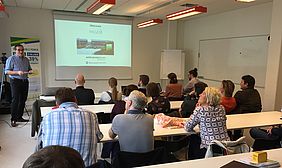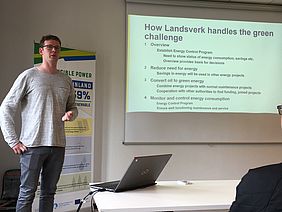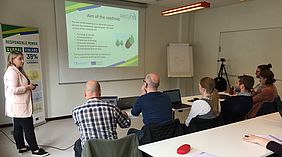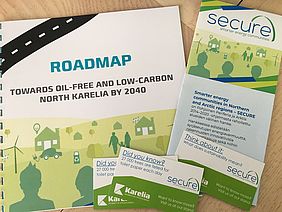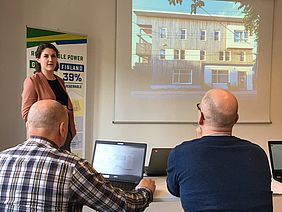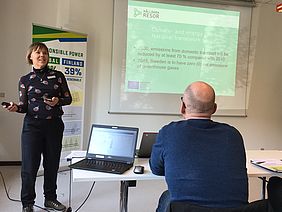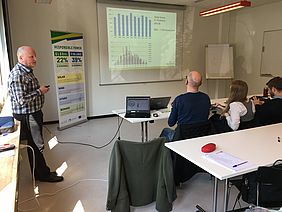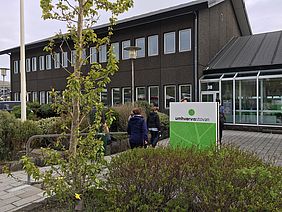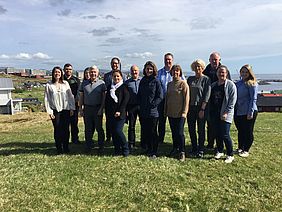The project seminar has been hosted by the SECURE project partner Umhvørvisstovan, an Environment Agency subsidiary of the Ministry of health and the interior of Faroe Islands with a broad portfolio. Petur Nielsen, Director of the agency, has welcomed the international visitors and he has offered an overview of Umhvørvisstovan’s work regarding energy optimisation. “The Agency is an active force in the community and employs various specialists within its areas of responsibility”.
Oil consumption in Faroe Islands is about 230.000 tonnes/year: 30.000 tonnes for electricity generation, 50.000 tonnes for heating (house hold sector), 30.000 tonnes for transportation on land and 120.000 tonnes for transportation at sea. Regarding energy consumption, it is about 10% as other kind of consumption takes the 90%. However, when speaking about electricity generation, oil is about 40% and wind and hydro about 60%.
According to Ari Johanneson, also from the Environment Agency, they are following a strategy: “the electricity production has to be based on renewable energy such as wind, hydro and solar energy”. Furthermore, “the consumption has to be adjusted to the electricity production, a flexible consumption”. In that way, to meet that goal, Johanneson highlights two tracks: supply and demand.
In reference to the supply, it is needed a further integration of wind, 100 MW during the next 10 years; pumped storage in Suðuroy island and Vestmanna town; battery systems and other storage systems; integration of solar energy (80 MW); prosumers and intelligent control systems. On the demand side, Johanneson mentions that electric vehicles and heat pumps have to relieve the traditional cars and burners and that it is needed to repeal the VAT on heat pumps, among others. “We need easy and cheap consumers solutions”.
Arne Debes from Landsverk, Ministry Engineering Office of the Faroe Islands, has spoken about the status of the energy consumption in public buildings. He has reminded that Government announced in 2015 a green goal for 2025: “Reduction in energy need for heating of buildings and 50% of all buildings shall be heated by green energy”. Landsverk is responsible for around 100 government owned buildings (250.00 m2 in total) and 50 rented buildings (50.000 m2). He adds that, in 2017, about 98% of the energy used for heating has been covered by oil.
With this scenery, Landsverk handles the green challenge by establishing an Energy Control Program (showing status of energy consumptions and savings), reducing the need of energy (using savings for other energy projects), converting oil to green energy (by cooperating with other authorities to find funding and joint projects) and monitoring and controlling energy consumption (though the mentioned Energy Control Program).
Johnny Durhuus, energy Technologist at Tórshavn municipality, explains that they are paying special attention to building maintenance by starting an approach to reduce energy consumption and CO2 emissions. According to the allocation of money, they are planning energy maintenance and organising initiatives. Apart from that, energy efficiency improvements in technical installations will be central to their work.
As a final speaker from Faroe Islands, Dennis Holm, Mayor at Vágs municipality, has highlighted municipality’s electric power savings. The first hydroelectric power plant in the Faroe Islands was built in Botni (northwest of Vágs) in 1921.
SECURE partners showcasing some achievements
Some of the project partners have shared some of their good practices with the attendants. Sini-Tuuli Saaristo from Karelia University of Applied Sciences (Finland) has been the first one speaking about the ‘Roadmap towards oil-free and low-carbon North Karelia by 2040’. The aim of this strategy is to define the steps to achieve regional goals and the process includes a focus on the low-carbon economy, local workshops and discussions with all sectors of the local economy, government, students and stakeholders. Ultimately, 50 organizations have developed the plan, adopted by the region’s governments.
Emma Norton from Ecology Action Centre (Canada) has shared the deep energy retrofit process of their office in Nova Scotia. This building is a showcase for environmentally-sensitive architecture and renovation in a tight urban setting. “It has reinvented the building to prepare for its second century of life”. EAC has increased the office space by 62% and decreased energy use by 89%. Norton has explained that the next step will be to install some solar panels through a Nova Scotia Community Solar Program. It is expected 9.9 MW output/year.
The last but not least of the invited speakers has been Jennie Olofsson, from Association of Local Authorities in Västernorrland (Sweden), who has mentioned some sustainable traveling and other ways to meet. According to the National framework policy, the climate and energy goals will be to reduce domestic transport emissions by at least 70% by 2030, in comparison to 2010. Furthermore, in 2040, Sweden is to have 0 net emissions of greenhouse gases. Olofsson has also explained that they have 10 travel coordinators developing awareness campaigns and events, meeting with employees and tracking statistics. With a budget of €4,24 million, they are going to invest in parking for bicycles, pedestrian and bicycle roads and technology.
Bjarti Thomsen, SECURE main contact in Umhvørvisstovan Environment Agency, has given a speech about solar energy in the Faroe Islands. He has spoken about solar hours in Tórshavn and the importance of the solar panels. As an end of the seminar, partners, stakeholders and local experts really enjoyed the moment when Thomsen was presenting on the plans for a 12kW solar installation on their agency building and the panels themselves arrived for construction this week!

